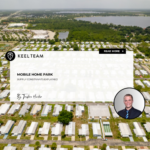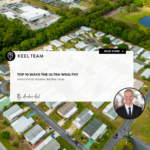Tips for Risk Mitigation in Your Mobile Home Park Investment
-
 Tristan Hunter - Investor Relations
Tristan Hunter - Investor Relations
Introduction to Strategies for Potentially Mitigating Risk:
A Mobile home Park Investment presents a unique set of opportunities and challenges. While the potential for steady income and long-term growth is typically evident, savvy investors understand the importance of mitigating risks in pursuit of a stable and rewarding investment. This article will explore comprehensive strategies for potentially mitigating risk when investing in a mobile home park, providing valuable insights for those looking to build a likely resilient and successful investment portfolio.

Understanding Risks in Mobile Home Park Investments:
Before exploring risk mitigation strategies, it’s crucial to understand the potential challenges associated with a mobile home park investment. These challenges generally include economic downturns, changing market conditions, tenant turnover, and regulatory changes. Acknowledging these risks is the first step toward potentially developing effective strategies for their mitigation.
1. Comprehensive Due Diligence:
One of the foundational pillars of likely risk mitigation in a mobile home park investment is thorough due diligence. This involves a meticulous examination of various factors, including the local market, property conditions, and potential for growth. Understanding the nuances of the investment landscape allows investors to possibly make informed decisions and identify potential red flags before they become significant issues.
2. Professional Networking:
Building a robust network within the real estate and mobile home park community is often invaluable for risk mitigation. Engaging with industry professionals, attending conferences, and participating in online forums provide access to insights, experiences, and best practices. Networking can also open doors to potential partnerships and collaborations, creating a support system for navigating challenges.
Forums like Mobile Home University and Biggerpockets offer opportunities to network with industry professionals and those starting out their mobile home park investing journey. Social media groups like the Mobile Home Park Mastermind Facebook Group and the Mobile Home Park Investors LinkedIn Group could also prove beneficial for those looking to build a network.
3. Legal Compliance and Regulation Awareness:
Staying abreast of local and federal regulations governing a mobile home park investment is generally crucial. Compliance with zoning laws, tenant rights, and other regulatory requirements is typically vital for avoiding legal complications. Regular updates on changes in legislation and maintaining strict adherence to compliance contribute towards risk mitigation and could help with preventative measures.
4. Diversification of Investments:
Diversifying your mobile home park portfolio is a prudent strategy for spreading and distributing risk. The saying ‘don’t put all of your eggs in one basket” is testament to this. Instead of concentrating all of your investment funds in a single property, consider investing in multiple properties in different locations or with distinct characteristics. Diversification can help minimize the impact of specific market challenges and potentially provides a safety net against unforeseen circumstances.
5. Analyzing Economic Trends:
Closely monitoring economic trends is often essential for risk mitigation. Economic downturns can impact the financial stability of both investors and tenants. By staying informed about economic indicators, investors can adjust their strategies accordingly, whether it involves adjusting rental rates, offering incentives, or making strategic financial decisions to weather economic challenges.
6. Long-Term Lease Agreements:
Establishing long-term lease agreements with tenants can contribute to stability in cash flow. By converting the Park Owned Homes to Tenant Owned Homes through a sale or rent to own arrangement, this can contribute to increased tenant retention. Tenants that own their home are likely to stay longer, resulting in stickier tenants. Long-term lot leases tend to provide a predictable income stream and can reduce the risk associated with frequent turnover. Additionally, offering incentives for longer leases can encourage tenant retention and help contribute to a more potentially stable and reliable rental income.
Download our free eBook on the “Top 20 Things Learned from Mobile Home Park Investing “
By Andrew Keel

7. Financial Resilience:
Maintaining financial resilience is usually crucial for risk mitigation in a mobile home park investment. Having a financial buffer to withstand unforeseen expenses, market fluctuations, or economic downturns can provide a safety net for investors. Adequate financial planning, including setting aside reserves for maintenance and unexpected expenses, can enhance the overall resilience of the investment.
8. Property Management Excellence:
Efficient property management is generally instrumental in risk mitigation. Ensuring that the mobile home park is well-maintained, addressing tenant concerns promptly, and implementing effective operational processes can potentially contribute to tenant satisfaction, and by extension, can encourage long-term stability. Well-managed properties are generally less susceptible to issues that could pose risks to the investment.
9. Insurance Coverage:
Investing in comprehensive insurance coverage is a proactive measure for risk mitigation. Insurance policies tailored to a mobile home park investment can potentially provide protection against various risks, including property damage, liability claims, and unforeseen events. Regularly reviewing and updating insurance coverage is an important step in pursuit of adequate protection.
10. Adaptability to Market Changes:
Mobile home park investors must be adaptable to changes in market trends. Understanding the evolving needs and preferences of tenants allows investors to typically adjust their strategies accordingly. Whether it involves introducing new amenities, upgrading facilities, or aligning with sustainable living trends, adaptability often contributes to the long-term success and risk mitigation of mobile home park investments.
Concluding thoughts on Strategies in Mobile Home Park Investments:
Mitigating risks in a mobile home park investment often requires a multifaceted and strategic approach. By combining thorough due diligence, professional networking, legal compliance, diversification, economic trend analysis, long-term lease agreements, financial resilience, property management excellence, and insurance coverage, investors can build a robust risk mitigation strategy.
In conclusion, the potential for success in a mobile home park investment is closely tied to an investor’s ability to proactively identify and address risks. Implementing these comprehensive risk mitigation strategies may not only safeguard the investment but also can lay the foundation for long-term stability and profitability. As the landscape of mobile home park investments continues to evolve, embracing these strategies can empower investors to navigate challenges and potentially build a resilient and rewarding portfolio.
At Keel Team Mobile Home Park Investments, our mission is twofold: to uplift communities and to potentially optimize investor returns. We prioritize enriching the lives of residents while potentially ensuring robust profits for our partners. Reach out via the contact details provided below to explore our investment approach and strategy in detail.”
Learn more about mobile home park investing.
Interested in learning more about mobile home park investing? Get in touch with us today to find out more.
Disclaimer:
The information provided is for informational purposes only and should not be considered investment advice, nor a guarantee of any kind. There are no guarantees of profitability, and all investment decisions should be made based on individual research and consultation with registered financial and legal professionals. We are not registered financial or legal professionals and do not provide personalized investment recommendations.

Tristan Hunter - Investor Relations
View The Previous or Next Post




